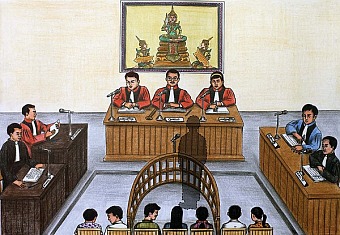In Absentia Appeals Becoming Normalized for Cambodia's Prisoners
Published on 23 April 2012Nearly 800 inmates detained in Cambodia's provinces are at risk of being deprived of their fundamental appeal rights due to a lack of inmate transport options, according to a new report from LICADHO.
Cambodian law requires the presence of the accused at appeal hearings, but few provincial inmates are able to appear due to lack of transportation funding and poor organization between the prisons and courts. The nation's lone Court of Appeal is located in Phnom Penh.
LICADHO first reported on the issue in 2010, in a report titled, "In Absentia: The Right of Appeal and Cambodia's Inmate Transportation Crisis." The report noted that the presence of the accused is essential to securing a fair appeal in Cambodia due to the nature of the country's appellate procedure.
"Cambodian law is explicit about both prisoners' right to attend their appeal hearings, and the importance of their attendance," said LICADHO Director Naly Pilorge. "Yet prisoners are routinely denied the right to attend their appeal hearings."
"This is a clear violation of the prisoners' fundamental trial rights, yet it has become normalized."
Following the release of LICADHO's 2010 report, prison authorities acknowledged that there was a "lack of services" for inmate transport, and said they were working to solve the problem. The 2010 report proposed a handful of solutions to the problem, including that inmates not be transferred from Phnom Penh area prisons before their appeals were heard and that the General Department of Prisons (GDP) expand funding for its inmate transportation network.
But it appears that little if any progress has been made toward these goals since 2010.
In a survey of 11 prisons located outside of Phnom Penh, LICADHO researchers found that there were at least 797 prisoners with appeals pending. Meanwhile, the prison system still lacks the vehicles, gasoline, staffing and funding necessary for a comprehensive long-distance inmate transportation network. As a result, prison directors continued to report that they had little or no means to transport these inmates to their hearings in Phnom Penh- unless the prisoners paid their own way.
"Forcing inmates to pay their own way is not an acceptable solution," said LICADHO President Dr. Pung Chhiv Kek. "This amounts to putting a price tag on fundamental rights."
LICADHO's latest report reiterates the recommendations made in the 2010 report, and proposes a new set of solutions, including the establishment of mobile appeal courts and/or a system of regional courts of appeal.
"The scope of this problem is daunting, both in terms of the resources required and the number of people affected," Kek said. "But that does not excuse inaction. The violation of inmates' trial rights has become systematic. Continuation of the status quo is simply not an option."
For more information, please contact:
▪ Dr. Pung Chhiv Kek, President of LICADHO (French, English, Khmer) - 012-802-506
▪ Ms. Naly Pilorge, Director of LICADHO (French, English) - 012-803-650
▪ Mr. Am Sam Ath Technical Supervisor for LICADHO (Khmer) - 012-327-770
PDF: Download full statement in English - Download full statement in Khmer








